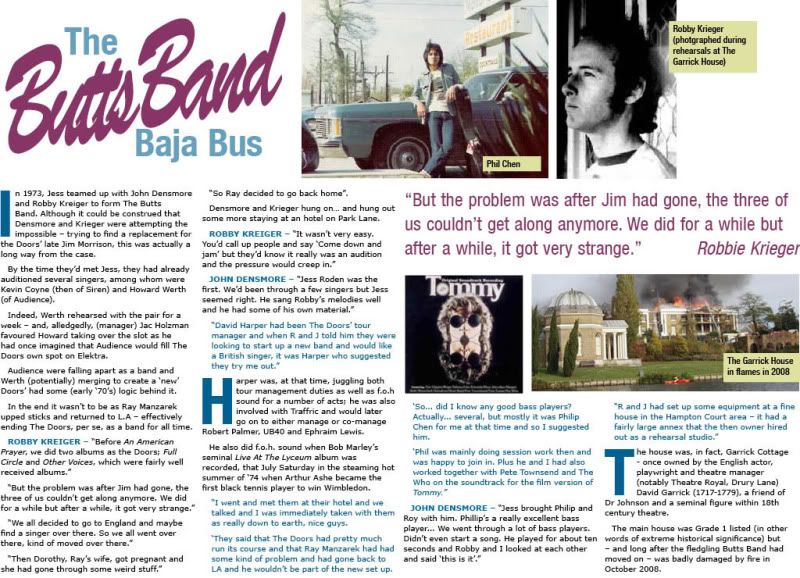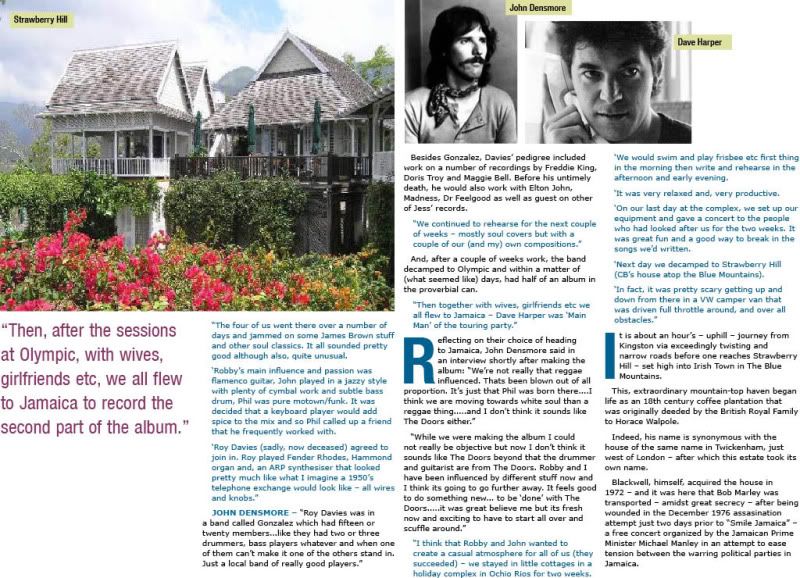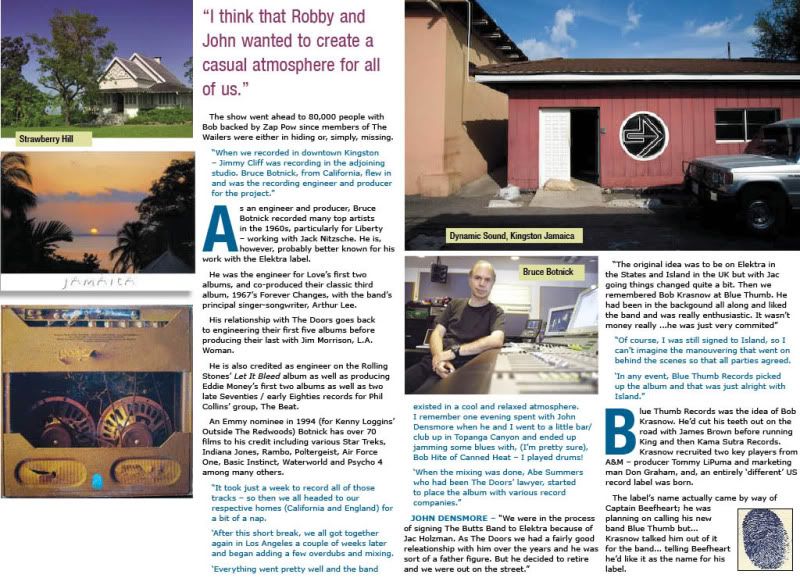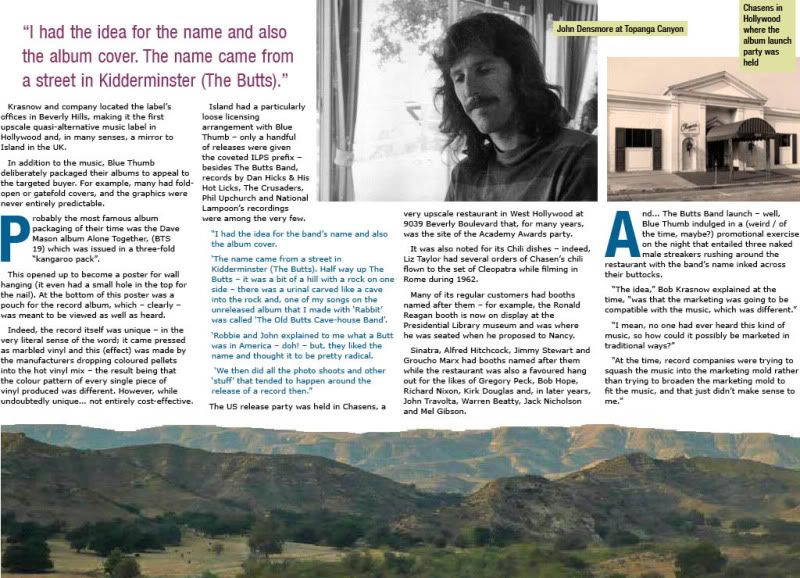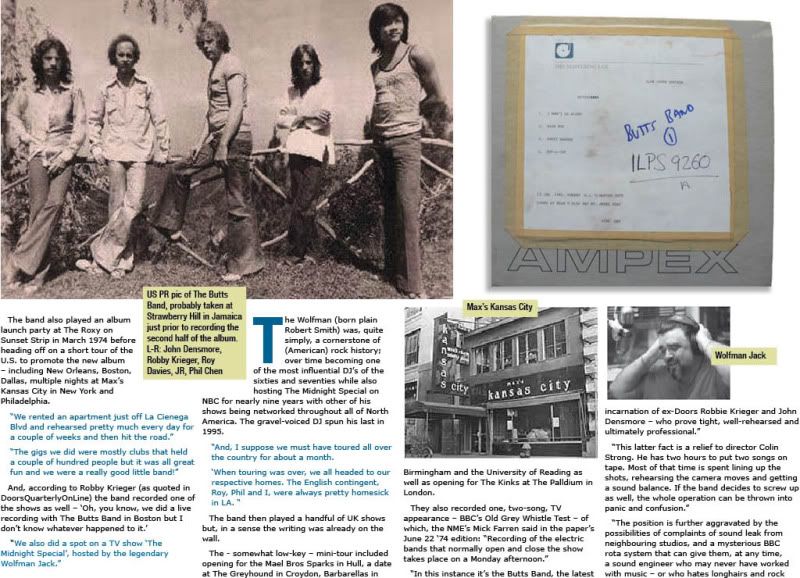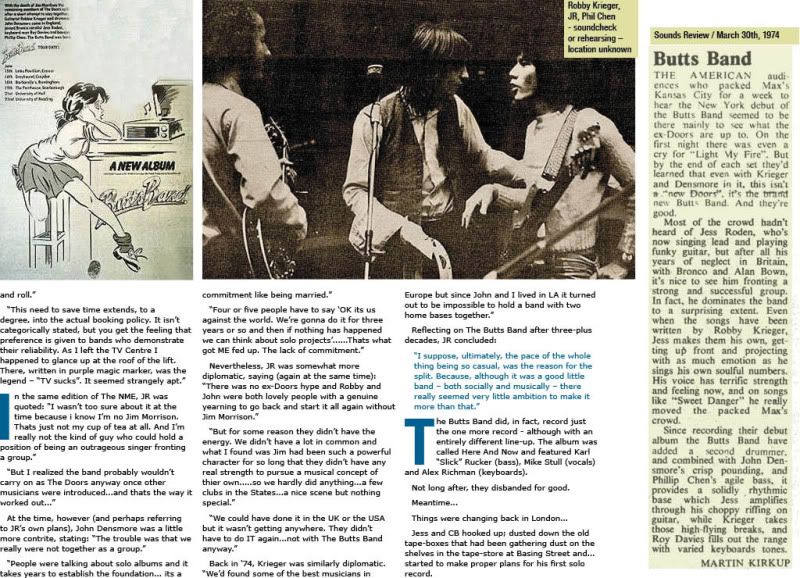Post by TheWallsScreamedPoetry on Mar 10, 2011 10:16:40 GMT
Baja Bus - The Butts Band:
##Jess Roden is in Pink##
In 1973, Jess teamed up with John Densmore and Robby Kreiger to form The Butts Band.
Densmore and Krieger were, in effect, attempting the impossible - trying to find a replacement for the Doors' late Jim Morrison. By the time they'd met Jess, they had already auditioned several singers, among whom were Kevin Coyne (then of Siren) and Howard Werth (of Audience).
Indeed, Werth rehearsed with the pair for a week – and, alledgedly, Jac Holzman favoured Howard taking over the slot as he had once imagined that Audience would fill The Doors own spot on Elektra.
Audience were falling apart as a band and Werth (potentially) merging to create a 'new' Doors' had some logic behind it, in the end it wasn't to be as Ray Manzarek upped sticks and returned to L.A – effectively ending The Doors, per se, as a band for all time.
As Robby Krieger points out, "Before An American Prayer, we did two albums as the Doors, Full Circle and Other Voices, which were fairly well received albums."
"But the problem was after Jim had gone, the three of us couldn't get along anymore. We did for a while but after a while, it got very strange. We all decided to go to England and maybe find a singer over there. So we all went over there, kind of moved over there. Then Dorothy, Ray's wife, got pregnant and she had gone through some weird stuff. So Ray decided to go back home". Densmore and Krieger hung on… and hung out some more staying at an hotel on Park Lane.
"It wasn't very easy. You'd call people up and say come on down and jam. But they's know it was anaudition and the pressure would creep in"
Robby Krieger
"Jess Roden was the first. We'd been through a lot of singers but Jess seemed right. He sang Robby's melodies well and had some of his own material."
John Desnmore
David Harper had been The Doors' tour manager and when Robby and John told him they were looking to start up a new band and would like a British singer, it was Harper who suggested they try me out.
Harper was, at that time, juggling both tour management duties as well as f.o.h sound for a number of acts; he was also involved with Traffric and would later go on to either manage or co-manage Robert Palmer, UB40 and Ephraim Lewis. He also did f.o.h. sound when Bob Marley's seminal Live At The Lyceum album was recorded, that July day in the steaming hot summer of '74 when Arthur Ashe became the first black tennis player to win Wimbledon.
I went and met them at their hotel and we talked and I was immediately taken with them as really down to earth, nice guys. They said that The Doors had pretty much run its course and that Ray Manzarek had had some kind of problem and had gone back to LA and he probably wouldn't be part of the new set up.
So... did I know any good bass players? Actually... several, but mostly it was Philip Chen for me at that time and so I suggested him. Phil was mainly doing session work then and was happy to join in. Plus he and I had also worked together with Pete Townsend and The Who on the soundtrack for the film version of 'Tommy'.
Jess brought Phillip and Roy with him. Phillip's a really excellent bass player. we went through a lot of bass players. Didn't even start a song. He played for about ten seconds and Robby and I looked at each other and said 'this is it'."
John Desnmore
R and J had set up some equipment at a fine house in the Hampton Court area - it had a fairly large annex that the then owner hired out as a rehearsal studio.
The house was, in fact, Garrick Cottage - once owned by the English actor, playwright and theatre manager (notably Theatre Royal, Drury Lane) David Garrick (1717-1779), a friend of Dr Johnson and a seminal figure within 18th century theatre. The main house was Grade 1 listed (in other words of extreme historical significance) but - and long after the fledgling Butts Band had moved on - was badly damaged by fire in October 2008.

Robby Krieger at Garrick Cottage 1973
The four of us went there over a number of days and jammed on some James Brown stuff and other soul classics. It all sounded pretty good although also, quite unusual.
Robbie's main influence and passion was flamenco guitar, John played in a jazzy style with plenty of cymbal work and subtle bass drum, Phil was pure motown/funk. It was decided that a keyboard player would add spice to the mix and so Phil called up a friend that he frequently worked with.
Roy Davies (sadly, now deceased) agreed to join in. Roy played Fender Rhodes, Hammond organ and, an ARP synthesiser that looked pretty much like what I imagine a 1950's telephone exchange would look like - all wires and knobs.
"Roy Davies was in a band called Gonzalez which had 15 to 20 members...like they had 2 or 3 drummers, bass players whatever and one of them can't make it the other one stands in. Just a local band of really good players."John Desnmore
Davies' own pedigree included work on a number of recordings by Freddie Kinbg, Doris Troy, Gonzalez and Maggie Bell. Before his untimely death, he would also work with Elton John, Madness, Dr Feelgood as well as guest on other of Jess' records.
After a couple of weeks working up songs the band decamped to Olympic Studio and within a matter of what seemed like days had half an album in the can.
We continued to rehearse for the next couple of weeks - mostly soul covers but with a couple of our (and my) own compositions. Then together with wives, girlfriends etc we all flew to Jamaica - Dave Harper was 'Main Man' of the touring party.
Reflecting on their choice of heading to Jamaica John Densmore said just after making the album.
"We're not really that reggae influenced. That's been blown out of all proportion. It's just Phil was born there....I think we are moving to white soul rather than a reggae thing.....and I don't think it sounds like The Doors either.
While we were making the album I could not really be objective but now I don't think it sounds like The Doors beyond the drummer and guitarist are from The Doors. Robby an dI have been influenced by different stuff now and I think it's goint to go further away. It feels good to do something new.....to be done with The Doors.....it was great believe me but it's fresh now and exciting to have to start all over and scuffle around"
I think that Robbie and John wanted to create a casual atmosphere for all of us (they succeeded) - we stayed in little cottages in a holiday complex in Ochio Rios for two weeks.
We would swim and play frisbee etc first thing in the morning then write and rehearse in the afternoon and early evening. It was very relaxed and, very productive.
On our last day at the complex, we set up our equipment and gave a concert to the people who had looked after us for the two weeks. It was great fun and a good way to break in the songs we'd written.
Next day we decamped to Strawberry Hill (CB's house atop the Blue Mountains). In fact, it was pretty scary getting up and down from there in a VW camper van that was driven full throttle around, and over all obstacles.
Its about an hour's - uphill - journey from Kingston via exceedingly twisting and narrow roads before one reaches Strawberry Hill - set high into Irish Town in The Blue Mountains.
This, extraordinary mountain-top haven began life as an 18th century coffee plantation that was originally deeded by the British Royal Family to Horace Walpole. Indeed, his name is synonymous with the house of the same name in Twickenham, just west of London - after which this estate took its own name.
Blackwell, himself, acquired the house in 1972 - and it was here that Bob Marley was transported - amidst great secrecy - after being wounded in the December 1976 assasination attempt just two days prior to "Smile Jamaica" - a free concert organized by the Jamaican Prime Minister Michael Manley in an attempt to ease tension between two warring political groups. The show went ahead to 80,000 people with Bob backed by Zap Pow since members of The Wailers were either in hiding or, simply, missing.
Robbie Krieger again - "We recorded half of the record in the U.K. and half in Jamaica which Phil helped with because he is from there and he was able to visit his mother and father for the first time in ten years".
The album was recorded in downtown Kingston - Jimmy Cliff was recording in the adjoining studio. Bruce Botnick, from California, flew in and was the recording engineer and producer for the project.

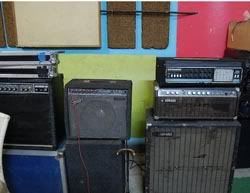
The studio in Kingston where the debut LP was recorded
It took just a week to record all of the tracks - so then we all headed to our respective homes (California and England) for a bit of a nap.
After this short break, we all got together again in Los Angeles a couple of weeks later and began adding a few overdubs and mixing.
Everything went pretty well and the band existed in a cool and relaxed atmosphere. I remember one evening spent with John Densmore when he and I went to a little bar/club up in Topanga Canyon and ended up jamming some blues with, (I'm pretty sure), Bob Hite of Canned Heat - I played drums!
When the mixing was done, Abe Summers who had been The Doors' lawyer, started to place the album with various record companies. Of course, I was still signed to Island, so I can't imagine the manouvering that went on behind the scenes so that all parties agreed. In any event, Blue Thumb records picked up the album and that was just alright with Island.
##Jess Roden is in Pink##
In 1973, Jess teamed up with John Densmore and Robby Kreiger to form The Butts Band.
Densmore and Krieger were, in effect, attempting the impossible - trying to find a replacement for the Doors' late Jim Morrison. By the time they'd met Jess, they had already auditioned several singers, among whom were Kevin Coyne (then of Siren) and Howard Werth (of Audience).
Indeed, Werth rehearsed with the pair for a week – and, alledgedly, Jac Holzman favoured Howard taking over the slot as he had once imagined that Audience would fill The Doors own spot on Elektra.
Audience were falling apart as a band and Werth (potentially) merging to create a 'new' Doors' had some logic behind it, in the end it wasn't to be as Ray Manzarek upped sticks and returned to L.A – effectively ending The Doors, per se, as a band for all time.
As Robby Krieger points out, "Before An American Prayer, we did two albums as the Doors, Full Circle and Other Voices, which were fairly well received albums."
"But the problem was after Jim had gone, the three of us couldn't get along anymore. We did for a while but after a while, it got very strange. We all decided to go to England and maybe find a singer over there. So we all went over there, kind of moved over there. Then Dorothy, Ray's wife, got pregnant and she had gone through some weird stuff. So Ray decided to go back home". Densmore and Krieger hung on… and hung out some more staying at an hotel on Park Lane.
"It wasn't very easy. You'd call people up and say come on down and jam. But they's know it was anaudition and the pressure would creep in"
Robby Krieger
"Jess Roden was the first. We'd been through a lot of singers but Jess seemed right. He sang Robby's melodies well and had some of his own material."
John Desnmore
David Harper had been The Doors' tour manager and when Robby and John told him they were looking to start up a new band and would like a British singer, it was Harper who suggested they try me out.
Harper was, at that time, juggling both tour management duties as well as f.o.h sound for a number of acts; he was also involved with Traffric and would later go on to either manage or co-manage Robert Palmer, UB40 and Ephraim Lewis. He also did f.o.h. sound when Bob Marley's seminal Live At The Lyceum album was recorded, that July day in the steaming hot summer of '74 when Arthur Ashe became the first black tennis player to win Wimbledon.
I went and met them at their hotel and we talked and I was immediately taken with them as really down to earth, nice guys. They said that The Doors had pretty much run its course and that Ray Manzarek had had some kind of problem and had gone back to LA and he probably wouldn't be part of the new set up.
So... did I know any good bass players? Actually... several, but mostly it was Philip Chen for me at that time and so I suggested him. Phil was mainly doing session work then and was happy to join in. Plus he and I had also worked together with Pete Townsend and The Who on the soundtrack for the film version of 'Tommy'.
Jess brought Phillip and Roy with him. Phillip's a really excellent bass player. we went through a lot of bass players. Didn't even start a song. He played for about ten seconds and Robby and I looked at each other and said 'this is it'."
John Desnmore
R and J had set up some equipment at a fine house in the Hampton Court area - it had a fairly large annex that the then owner hired out as a rehearsal studio.
The house was, in fact, Garrick Cottage - once owned by the English actor, playwright and theatre manager (notably Theatre Royal, Drury Lane) David Garrick (1717-1779), a friend of Dr Johnson and a seminal figure within 18th century theatre. The main house was Grade 1 listed (in other words of extreme historical significance) but - and long after the fledgling Butts Band had moved on - was badly damaged by fire in October 2008.

Robby Krieger at Garrick Cottage 1973
The four of us went there over a number of days and jammed on some James Brown stuff and other soul classics. It all sounded pretty good although also, quite unusual.
Robbie's main influence and passion was flamenco guitar, John played in a jazzy style with plenty of cymbal work and subtle bass drum, Phil was pure motown/funk. It was decided that a keyboard player would add spice to the mix and so Phil called up a friend that he frequently worked with.
Roy Davies (sadly, now deceased) agreed to join in. Roy played Fender Rhodes, Hammond organ and, an ARP synthesiser that looked pretty much like what I imagine a 1950's telephone exchange would look like - all wires and knobs.
"Roy Davies was in a band called Gonzalez which had 15 to 20 members...like they had 2 or 3 drummers, bass players whatever and one of them can't make it the other one stands in. Just a local band of really good players."John Desnmore
Davies' own pedigree included work on a number of recordings by Freddie Kinbg, Doris Troy, Gonzalez and Maggie Bell. Before his untimely death, he would also work with Elton John, Madness, Dr Feelgood as well as guest on other of Jess' records.
After a couple of weeks working up songs the band decamped to Olympic Studio and within a matter of what seemed like days had half an album in the can.
We continued to rehearse for the next couple of weeks - mostly soul covers but with a couple of our (and my) own compositions. Then together with wives, girlfriends etc we all flew to Jamaica - Dave Harper was 'Main Man' of the touring party.
Reflecting on their choice of heading to Jamaica John Densmore said just after making the album.
"We're not really that reggae influenced. That's been blown out of all proportion. It's just Phil was born there....I think we are moving to white soul rather than a reggae thing.....and I don't think it sounds like The Doors either.
While we were making the album I could not really be objective but now I don't think it sounds like The Doors beyond the drummer and guitarist are from The Doors. Robby an dI have been influenced by different stuff now and I think it's goint to go further away. It feels good to do something new.....to be done with The Doors.....it was great believe me but it's fresh now and exciting to have to start all over and scuffle around"
I think that Robbie and John wanted to create a casual atmosphere for all of us (they succeeded) - we stayed in little cottages in a holiday complex in Ochio Rios for two weeks.
We would swim and play frisbee etc first thing in the morning then write and rehearse in the afternoon and early evening. It was very relaxed and, very productive.
On our last day at the complex, we set up our equipment and gave a concert to the people who had looked after us for the two weeks. It was great fun and a good way to break in the songs we'd written.
Next day we decamped to Strawberry Hill (CB's house atop the Blue Mountains). In fact, it was pretty scary getting up and down from there in a VW camper van that was driven full throttle around, and over all obstacles.
Its about an hour's - uphill - journey from Kingston via exceedingly twisting and narrow roads before one reaches Strawberry Hill - set high into Irish Town in The Blue Mountains.
This, extraordinary mountain-top haven began life as an 18th century coffee plantation that was originally deeded by the British Royal Family to Horace Walpole. Indeed, his name is synonymous with the house of the same name in Twickenham, just west of London - after which this estate took its own name.
Blackwell, himself, acquired the house in 1972 - and it was here that Bob Marley was transported - amidst great secrecy - after being wounded in the December 1976 assasination attempt just two days prior to "Smile Jamaica" - a free concert organized by the Jamaican Prime Minister Michael Manley in an attempt to ease tension between two warring political groups. The show went ahead to 80,000 people with Bob backed by Zap Pow since members of The Wailers were either in hiding or, simply, missing.
Robbie Krieger again - "We recorded half of the record in the U.K. and half in Jamaica which Phil helped with because he is from there and he was able to visit his mother and father for the first time in ten years".
The album was recorded in downtown Kingston - Jimmy Cliff was recording in the adjoining studio. Bruce Botnick, from California, flew in and was the recording engineer and producer for the project.


The studio in Kingston where the debut LP was recorded
It took just a week to record all of the tracks - so then we all headed to our respective homes (California and England) for a bit of a nap.
After this short break, we all got together again in Los Angeles a couple of weeks later and began adding a few overdubs and mixing.
Everything went pretty well and the band existed in a cool and relaxed atmosphere. I remember one evening spent with John Densmore when he and I went to a little bar/club up in Topanga Canyon and ended up jamming some blues with, (I'm pretty sure), Bob Hite of Canned Heat - I played drums!
When the mixing was done, Abe Summers who had been The Doors' lawyer, started to place the album with various record companies. Of course, I was still signed to Island, so I can't imagine the manouvering that went on behind the scenes so that all parties agreed. In any event, Blue Thumb records picked up the album and that was just alright with Island.


